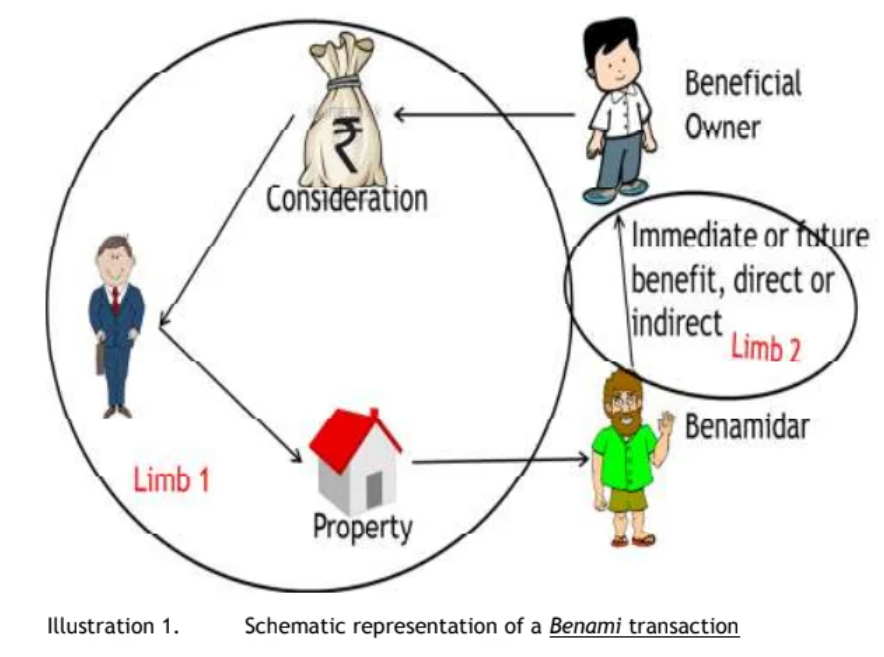Supreme Court Recalls 2022 Ruling on Benami Transactions Act, Restores Provisions for Fresh Adjudication
(Source: Indian Express; Section: Express Network; Page: 07)
| Topic: GS2 – Polity |
|
Analysis of News:

About Benami Transactions (Prohibition) Act, 1988, act
- Definition of Benami Transaction: The Act defines a benami transaction as a transaction where a property is held by or transferred to one person, but the consideration for the property is provided by another person, and the property owner denies knowledge of ownership or the transaction involves a fictitious name.
Prohibition of Benami Property Transactions Act, 1988
- It is an Act of the Parliament of India that prohibits certain types of financial transactions.
- The act defines a ‘benami’ transaction as any transaction in which property is transferred to one person for consideration paid by another person.
-
- Such transactions were a feature of the Indian economy, usually relating to the purchase of property (real estate), and were thought to contribute to the Indian black money problem.
- The act bans all benami transactions and gives the government the right to recover property held benami without paying any compensation.
Benami Transactions (Prohibition) Amendment Act, 2016
- The Act seeks to deal with all such transactions which are carried out by a certain person but the consideration is provided and benefits are availed by some other person.
- A benami transaction, as defined under Section 2(9) of the Act is a transaction in which:
-
- The property is held by one person and paid for by another; or
-
- It is held in a fictitious name; or
-
- The owner of such property is unaware of or denies having knowledge of such ownership; or
-
- The person financing such a transaction is not traceable.
Reason for Review and Reversal
- A bench led by Chief Justice D.Y. Chandrachud, along with Justices J.B. Pardiwala and Manoj Misra, accepted the Solicitor General’s argument that the constitutional validity of the unamended 1988 Act was not under challenge in the first place.
- The court clarified that the original judgment had addressed an issue not contested by the parties, leading to its decision to allow the review petition and recall the previous judgment.
Restored Civil Appeals and Review Process
- The court restored the civil appeal for fresh adjudication and allowed all those affected by the 2022 judgment to seek a review of their respective orders.
- This opens the door for cases impacted by the 2022 decision to be reconsidered in light of the restored legal provisions.
Concerns Over the 2022 Judgment
- The August 2022 ruling had deemed Section 3(2) of the Benami Transactions Act, which prescribed jail terms for entering into benami transactions, unconstitutional.
- Additionally, it held that the 2016 amendments could only be applied prospectively, quashing all prosecutions or confiscations before the amendments took effect.
Concerns on PMLA Interpretation
- The court also raised concerns about a previous judgment upholding the Prevention of Money Laundering Act (PMLA), particularly regarding the potential for arbitrary application in property confiscations before trial.
- It hinted that further clarification is needed to prevent misuse of these provisions.
Context of the 2022 Ruling
- The 2022 judgment had emerged from the Centre’s appeal against a 2019 Calcutta High Court decision that found no provision allowing the retrospective application of the 2016 amendments to the Benami Transactions Act.
- With the review, the legal landscape for benami transactions and property confiscations now reopens for fresh adjudication.
| PYQ: With reference to the ‘Prohibition of Benami Property Transactions Act, 1988 (PBPT Act)’, consider the following statements: (2017)
1) A property transaction is not treated as a benami transaction if the owner of the property is not aware of the transaction. 2) Properties held benami are liable for confiscation by the Government. 3) The Act provides for three authorities for investigations but does not provide for any appellate mechanism. Which of the statements given above is/are correct?
(a) 1 only (b) 2 only (c) 1 and 3 only (d) 2 and 3 only
Ans: (b) |
| Practice Question: Examine the implications of the Supreme Court’s decision to recall its 2022 ruling on the Benami Transactions (Prohibition) Act, 1988. What are the potential impacts on legal enforcement, property rights, and the broader framework for combating financial crimes in India? (250 words/15 m) |
